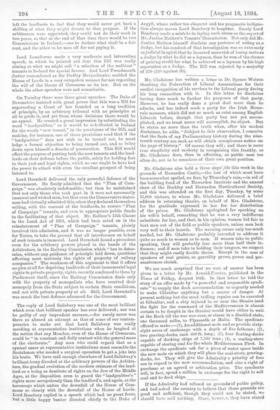Lord Hersehell delivered the only powerful defence of the Government.
He freely admitted that the " Plan of Cam- paign" was absolutely indefensible ; but then he maintained that not only those who took part in it were not necessarily immoral and wicked men, but that even the Conservative states. men had virtually admitted this, when they declared themselves willing, with the consent of the landlords, to restore "Plan of Campaign" tenants, and even to appropriate public funds to the facilitating of that object. Mr. Balfour's 13th Clause in the Land Act of 189], which had been acted on in the reinstatement of " Plan of Campaign " tenants, plainly involved this admission, and it was no longer possible, even for Tories, to take the ground that all interference on behalf of such tenants is immoral. Lord Hersohell found a precedent even for the arbitrary powers placed in the hands of the Arbitrators, in the Railway Commission which "has to deter- mine, without any guidance of principle laid down, questions affecting most seriously the rights of property of railway companies." The weakness of this argument is that it offers no plea at all for depriving landlords of their immemorial legal rights in private property, rights recently confirmed to them by Parliament itself, since the Railway Commission deals only with the property of monopolists who have received their monopoly from the State subject to certain State conditions, and not with private property at all. Still, Lord Herschell's was much the best defence advanced for the Government.


































 Previous page
Previous page